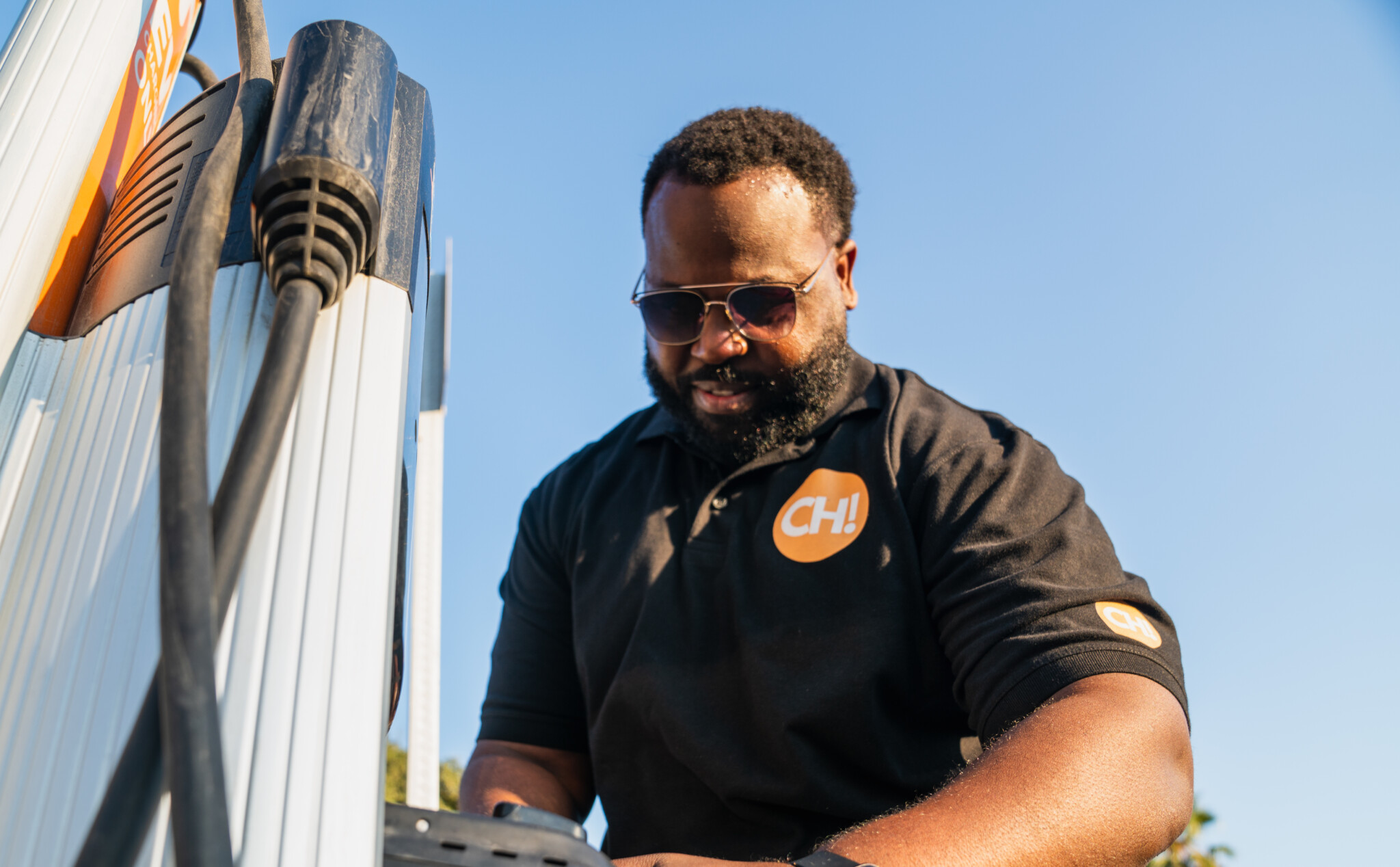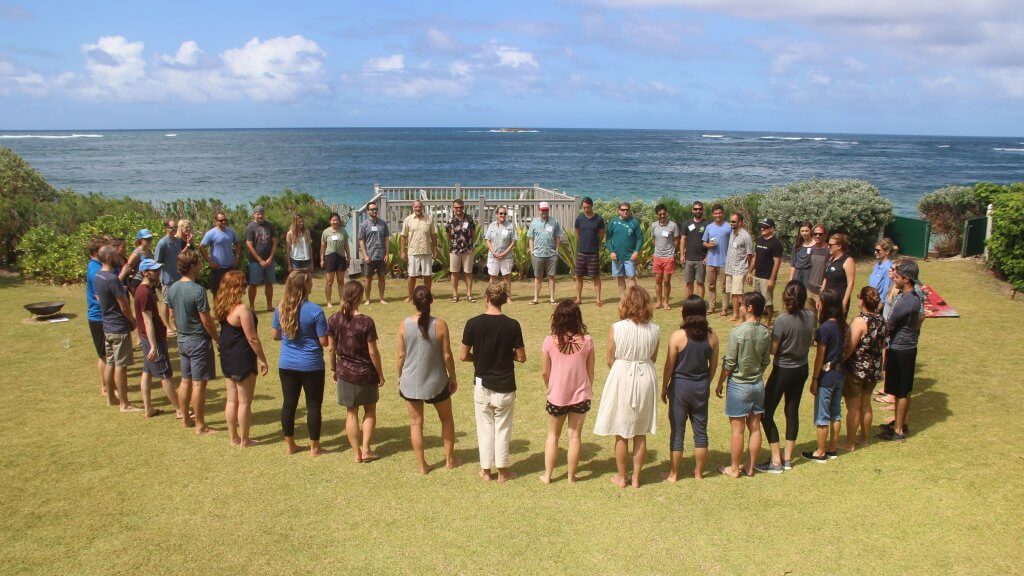
Friends, we are thrilled to welcome 19 new companies into the Elemental portfolio.
This is our seventh cohort, and it’s bursting with what we call Earthshot ideas — technological and business innovations that have the potential to transform our world for the better. Earthshot ideas are designed to make our communities more resilient and more sustainable. They can pave a path to a future where people thrive and economies prosper, without damaging our planet.
And this year, we gathered a bounty of Earthshot ideas that we can’t wait to share with you.
They come from 19 startups squaring off against the biggest challenges in modernizing our energy, water, mobility, and agriculture systems while ensuring equitable access to clean technology in every community. 19 passionate teams made up of risk-takers, change-makers, and Gordian-knot cutters. 19 Earthshot ideas designed to end our dependence on fossil fuels, assure abundant and safe drinking water, and tackle the mounting crisis of plastic waste. 19 innovations that will shape the future of electric mobility, the circular economy, and much more.
Before we introduce the new companies in this cohort, we wanted to highlight some of the trends we’ve been tracking as we selected this cohort:
👓 The circular economy comes into focus. We’ve witnessed a broad maturation in the companies and technologies that can transform our economy from one that is extractive into one that is fundamentally restorative and regenerative. Some, like BioCellection and Full Cycle Bioplastics, are emerging from significant R&D time and are now primed to make the leap from the lab into commercialization. Others, like Yerdle Recommerce and CarbonCure, are poised for market expansion and growth, where they can significantly shrink the carbon footprint of supply chains and the built environment. As resource scarcity reaches a tipping point and it becomes more economically practical to reuse and recycle materials, we expect this trend will only continue to magnify.
🚀 Electrification of transportation, including aviation, is ready for takeoff. With a high volume of short-haul flights, Hawaii is the perfect testing ground for an electric aviation company like Ampaire. And we are supporting electric mobility companies like Proterra, Scoot, and Chargetrip as they expand outside of their home markets and into new customer segments.
💧 Increasing access to clean, reliable drinking water. While it might not be as eye catching as electric planes and carbon-infused concrete, water scarcity and contamination are growing challenges we are focusing on in regions like California and Australia, where we will be deploying projects with Microvi – which removes nitrate contamination in a low-cost, low-impact way – and Zero Mass Water – which builds solar panels that create drinking water.
🌱 Equitable distribution of clean technology. Our new Equity & Access track is designed to increase access to innovation in low- to moderate-income communities, and is aligned with California’s plan to prioritize LMI communities when allocating funds from its cap-and-trade program. That we saw such strong interest in this track — 42% of this year’s startup applicants applied for it — reinforces our belief that beyond social responsibility, this market presents an attractive business opportunity.
And with that, please take some time to get to know the startups in our seventh cohort, their Earthshot ideas, and why we love them.
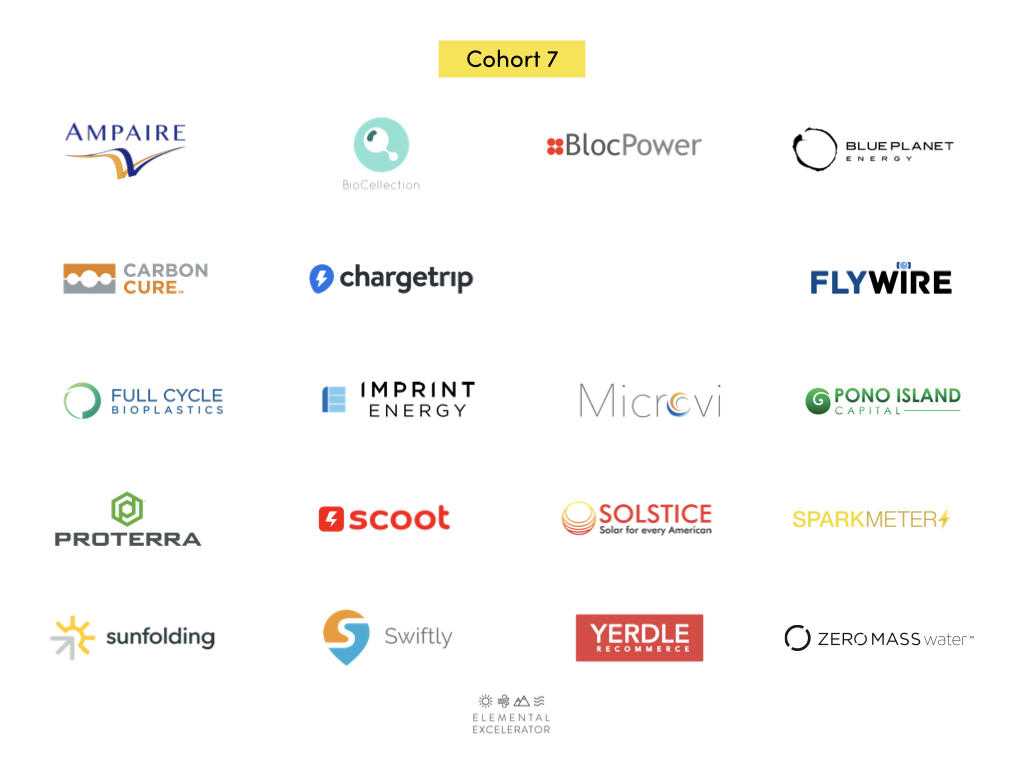
DEMONSTRATION
Ampaire | MOBILITY
Electric commercial aircraft
Why do we love them? Electrifying the aviation industry can have a massive impact on global carbon emissions — but it’s a massively difficult challenge. In Hawaii, for example, the aviation sector accounts for the highest percentage of petroleum use (32% as of 2016). Ampaire’s approach is to retrofit existing airplanes with batteries, rather than building an entirely new electric airplane from the ground up. Their initial target market is 9-19 seat airplanes, meaning they can be especially beneficial in Hawaii where many short-haul airplanes carry passengers and freight between the islands.
Blue Planet Energy Systems | SOLAR & STORAGE
Safe, powerful energy storage
Why do we love them? As Hawaii’s leading energy storage manufacturing company, Blue Planet Energy Systems has developed safe and reliable battery system for larger-scale microgrid settings. The Blue Ion ferrous phosphate (LiFePO4) battery contains no rare materials and has a cathode material that is intrinsically safer than the current generation of lithium ion batteries. The abundant and conflict-free source material makes this the most responsible energy storage composition on the market.
CarbonCure | CIRCULAR ECONOMY
Reducing the carbon footprint of the built environment
Why do we love them? CarbonCure’s technology injects CO2 into the most abundant man-made material in the world — concrete. The company’s machinery can be easily retrofitted into existing concrete plants, making it a simple way to reduce and recycle CO2 waste while enhancing the structural integrity of building materials. With an eye toward expanding to Asia Pacific markets, CarbonCure sees Hawaii as the perfect launching ground.
Proterra | MOBILITY
The electric bus for the masses
Why do we love them? Proterra designs and manufactures zero-emission electric buses. Proterra is already piloting their busses locally in collaboration with the City and County of Honolulu, and is working to lower barriers to entry for electric buses across the Hawaiian islands.
SparkMeter | GRID & EFFICIENCY
Smart meters for emerging markets
Why do we love them? More than a billion people in the world lack access to electricity. SparkMeter’s simple, low-cost smart metering solutions are designed to alleviate this energy poverty and make access to electricity possible in hard-to-reach places and underserved markets. The company’s product works in both rural microgrid and existing urban central grid settings, and was created by veterans of microgrid development projects in Haiti.
Sunfolding | SOLAR & STORAGE
Seriously simplified air-driven solar trackers
Why do we love them? Sunfolding’s solar trackers use simple, air-powered components to pivot panels, instead of the mechanical devices found in traditional tracking arrays. And Sunfolding’s easy-to-install, low-maintenance systems can yield 20% greater energy than traditional ground-mounted PV arrays. Sunfolding’s technology allows for greater flexibility in sighting and laying out solar projects, meaning less land (and less maintenance) is needed to produce more energy.
Zero Mass Water | WATER
Making drinking water from sunlight and air
Why do we love them? Zero Mass Water’s product is a category-defining technology that uses the power of the sun to make clean drinking water from the air. The company’s SOURCE Hydropanels require no infrastructure and can efficiently operate across a wide range of climates, particularly where water is scarce. Over a 15-year lifespan, each Hydropanel displaces over 50,000 PET plastic bottles. Our project with Zero Mass Water, in partnership with aboriginal-owned Wilco Electrical, will directly offset the use of over 30 million plastic bottles in Western Australia.
EQUITY & ACCESS
BioCellection | CIRCULAR ECONOMY
Upcycling hard-to-recycle plastic waste
Why do we love them? Outside of climate change, plastics pollution is one of the world’s greatest environmental threats. BioCellection’s technology addresses the problem of hard-to-recycle and unrecyclable plastics, which often end up in landfills or are incinerated in facilities located in or near low- to moderate-income communities. BioCellection’s chemical process has no harmful emissions and diverts this waste by turning dirty plastics and films into biodegradable chemicals.
BlocPower | GRID & EFFICIENCY
Machine learning and structured finance to green inner cities
Why do we love them? Older buildings found in inner cities and financially underserved communities are often the ones that could benefit the most from energy efficiency upgrades. But financial constraints can make it difficult to secure clean energy retrofits for them. BlocPower collects and analyzes data from buildings (such as community centers, churches, and multifamily residences) to identify which have the most potential for energy savings. By grouping these buildings into “blocs,” BlocPower can help dilute risk and secure investments for new clean energy projects.
Microvi Biotech | WATER
Biotechnologies for safe drinking water, wastewater treatment, and renewable chemicals
Why do we love them? Nitrate is the most prevalent groundwater contaminant in the world. Microvi has developed a biological technology — made up of naturally occurring, high-performing organisms — that removes this common and harmful pollutant by completely degrading it into harmless nitrogen gas with no biological waste. Microvi is committed to installing affordable, modular, turnkey treatment systems in disadvantaged agricultural regions where nitrate contamination is overwhelming the drinking water supply.
Scoot Networks | MOBILITY
Shared electric vehicles
Why do we love them? Scoot creates solutions for the last-mile problem and increases access to electric vehicles with a fleet of electric scooters, bicycles, and kick-scooters. It has a reputation for being an excellent local partner to the city of San Francisco and acting with the community in mind. Scoot’s project will explore ways to expand payment options for low-income customers or those without credit cards, and create best practices for activating community participation.
Solstice Power Technologies | SOLAR & STORAGE
Shared solar for every American
Why do we love them? Solstice is dedicated to building the most comprehensive community solar marketplace on the internet. Solstice couples this online solar marketplace with digital community organizing and partnership with local community-based organizations to connect users to renewable energy. Solstice also invented the EnergyScore, a proprietary underwriting standard for solar customers that is 1) more accurate in predicting who will pay their utility bill and 2) more inclusive of low-income Americans than the industry standard FICO credit scores.
Swiftly | MOBILITY
A big data platform for public transportation
Sound familiar? Swiftly was a member of last year’s Cohort 6. This year, we are working with them to implement their solution through the equity and access lens, making public transportation more efficient and thus reducing the time and expense of mobility for low-income communities. Here’s a little more on what we loved about them last year, and still love about them: Swiftly enables the use of real-time data to help transit agencies make critical infrastructure decisions to efficiently move people. Swiftly is the creator of Transitime, the most advanced passenger information system on the market. Transitime monitors the real-time and historical movements of buses and other public transportation vehicles to predict arrival and departure times more accurately than existing systems. Swiftly’s platform is now used by more than 50 transit agencies and impacts over 2 million transit riders per day. .
Yerdle Recommerce | CIRCULAR ECONOMY
Powering resale for leading brands
Why do we love them? With Yerdle, which creates and operates white-label resale marketplaces for large apparel brands, we are making our first entry into supply chain technologies. The company has shown deep commitment to solving some of the tricky supply chain and natural resource problems faced by our consumer world. Our funding will go toward helping Yerdle invest in job creation by hiring from disadvantaged communities near their facilities.
GO-TO-MARKET
Chargetrip | MOBILITY
Smart navigation for electric mobility
Why do we love them? This Dutch company, which builds an intelligent navigation platform for electric vehicles, actually got its start in Norway, the country with the highest share of electric vehicles in the world. Chargetrip sees the U.S. as a key growth market. And with their background in EV charging and driving data and familiarity with charging infrastructure, they can bring a unique insight into what is needed to grow innovation in this sector in the U.S.
FlyWire Cameras | FOOD & AG
Electronic monitoring for sustainable fisheries
Why do we love them? Many small fisheries face a conundrum in verifying that their fish is sustainably caught (which can add a 20% premium to its price). Keeping observers on board your vessel can be logistically difficult, expensive, and dangerous, while the monitoring systems used by commercial fishing fleets are both expensive and too large for smaller boats. FlyWire Cameras’ HD video-based monitoring system provides high-quality data collection around catch composition at a tenth of the cost of existing monitoring systems.
Full Cycle Bioplastics | CIRCULAR ECONOMY
Converting organic waste into compostable bioplastic
Why do we love them? We love companies that tackle climate change and companies that tackle food waste. So we adore Full Cycle Bioplastics for tackling both at the same time. Full Cycle’s technology produces a fully compostable, marine-degradable bioplastic polymer out of mixed organic waste (one of the largest man-made generators of greenhouse gas emissions), such as inedible food waste, agricultural by-products or cardboard. And it’s a fully closed-loop solution: once it has served its purpose, the bioplastic product can either biodegrade or be upcycled back into bioplastic polymers for another product.
Imprint Energy | SOLAR & STORAGE
Ultra-thin, flexible, printed batteries
Why do we love them? Imprint Energy’s screen-printable batteries offer high power density in a small, customizable, and rechargeable package, making them a great application for IoT devices, sensors, and wearables. They can be integrated into manufacturing processes, like being directly printed onto circuit boards. And with a chemistry based on zinc rather than lithium, Imprint’s batteries avoid the safety issues that have plagued many lithium technologies and added to their costs.
Pono Island Capital | FOOD & AG
Hawaii-based carbon offset fund
Why do we love them? Meeting the demand of companies with a desire or requirement to offset emissions, Pono Island Capital will deploy capital and provide oversight to develop Hawaii-based carbon credits and focus on native tree restoration throughout the state.
By the Numbers
Data enthusiasts, gather ’round! Here’s a look at Cohort 7 by the numbers:
- 500 startups at the top of our funnel
- 212 met the minimum requirements of an operating prototype, at least two full-time team members, and building businesses in our focus areas
- 19 startups were chosen — a 4% acceptance rate
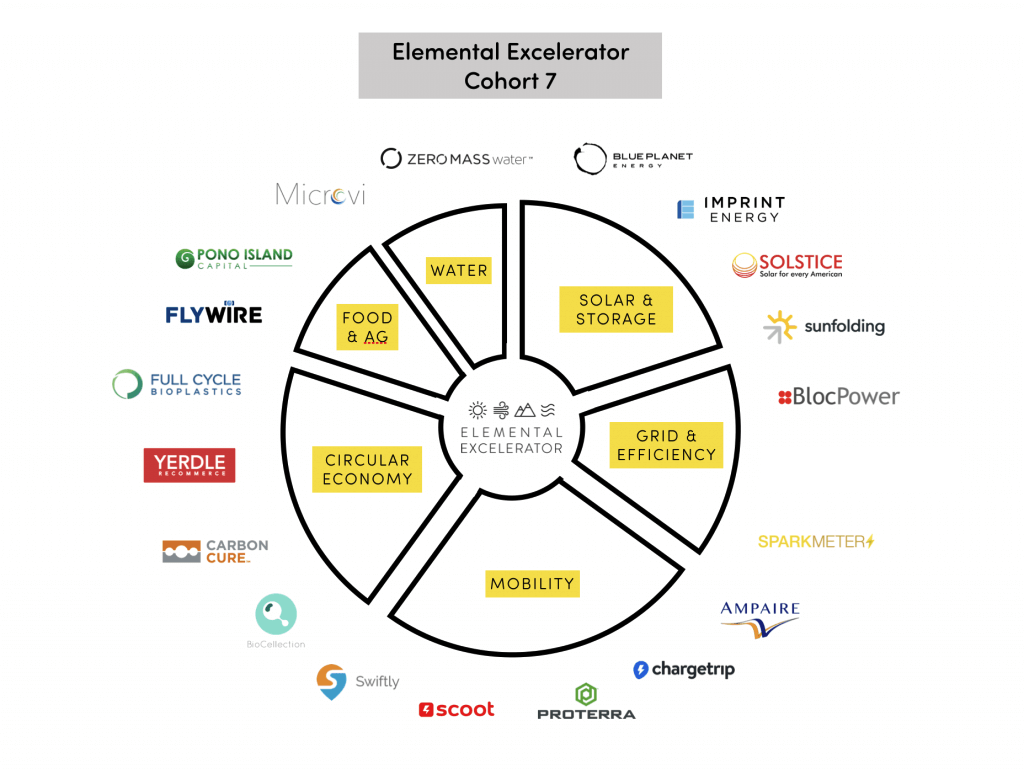
We are a growth-stage accelerator. Here are vital stats on Cohort 7:
- 90% of the companies are generating revenue
- The median company in this cohort has 10 full-time employees and has raised $7.2 million in outside funding
- Our “sweet spot” is companies that fall between the Seed and Series C funding range — this year’s cohort is distributed across all four stages of funding
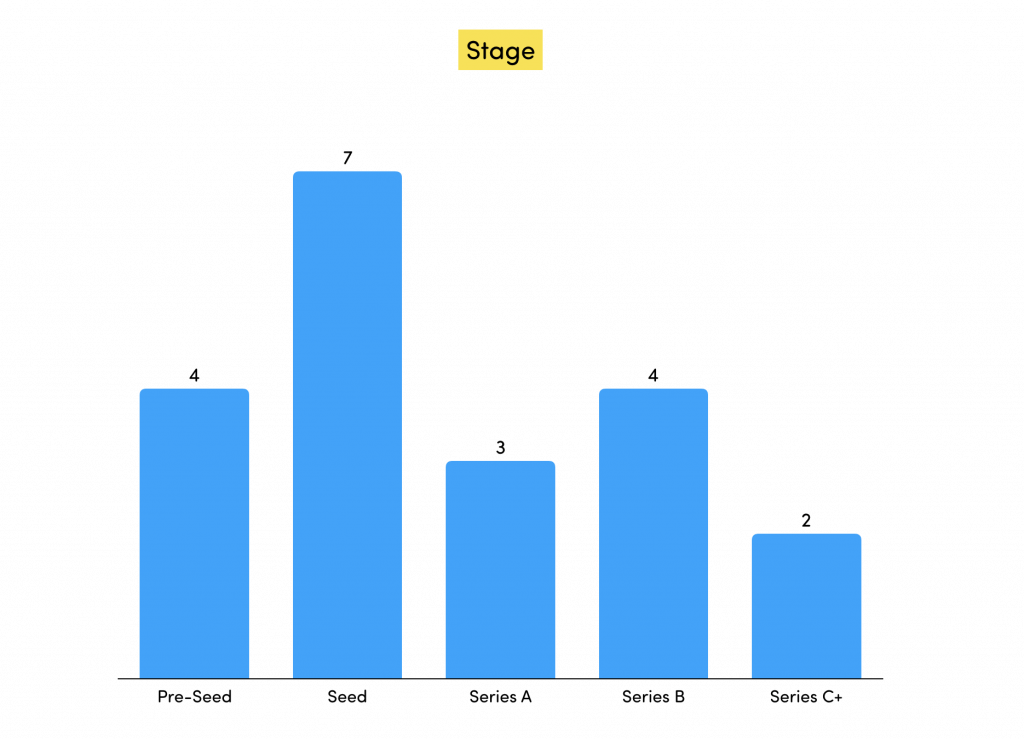
Interested in being a part of next year’s cohort? We’d love to hear from you! Please take 4 minutes to share some information with us or refer a company here.


